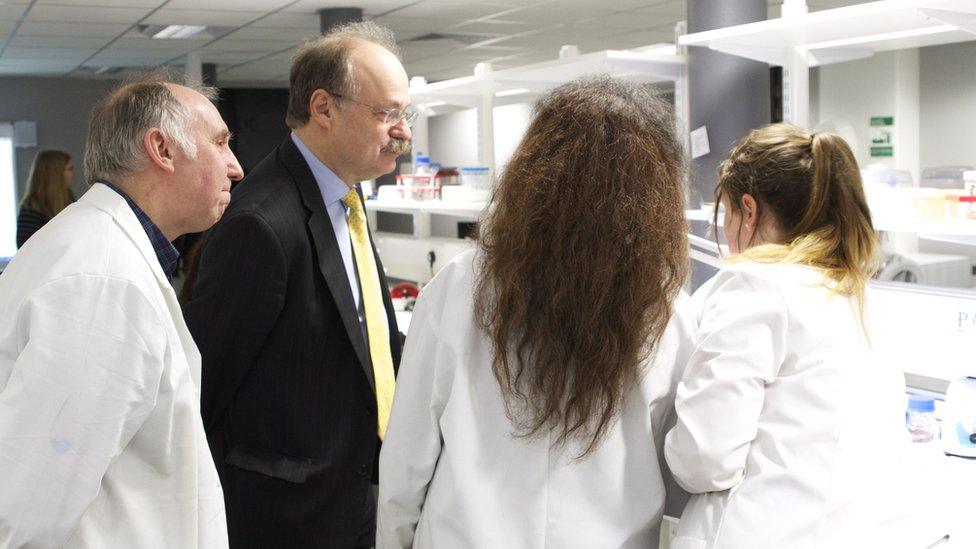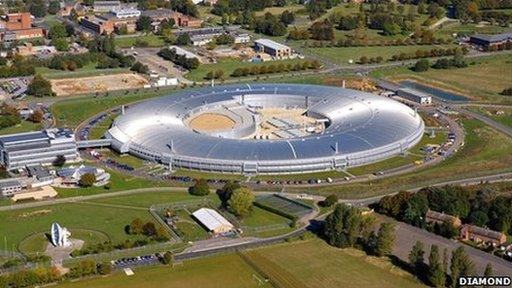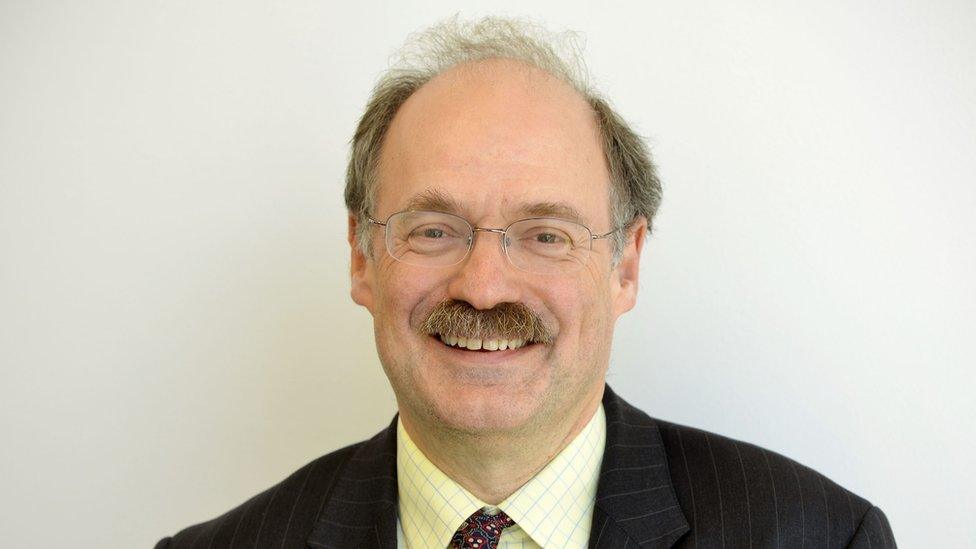UK research chief 'will not direct science'
- Published

Prof Sir Mark Walport (second left) is seen visiting a school in Liverpool that specialises in science and healthcare. He is now one of the most powerful men in British science
Britain's new research chief has said that he won't centrally direct scientific research.
Prof Sir Mark Walport will be responsible for all public research spending in Britain next year.
In an exclusive interview with BBC News, Prof Walport said that he wants to be a "powerful voice for science" in dealing with government.
In the first interview in his new role, he sets out his vision for the new research agency he heads.
Currently, UK research is funded by nine separate organisations. Each body specialises in specific fields, such as environmental research, the physical science and the biosciences.
The system has contributed to Britain leading the world in many areas of research.
The government is replacing it with the United Kingdom Research and Innovation agency (UKRI), which will oversee and co-ordinate the work of the research organisations when it formally takes control on 1 April 2018.
But as its new chief executive, Prof Walport - currently the government's chief scientist - is already working to ensure that the new agency hits the ground running.
Centrally run
Critics of the reform fear that the "super research council" will direct research centrally and be driven by economic priorities and the whims of ministers - rather than support the best curiosity-driven research as the current system allows and encourages.
Prof Walport told me that these fears were "completely wrong".

Will basic curiosity-driven research suffer once UKRI starts controlling science funding?
"We are going to continue to support the brightest minds to tackle the problems as they see them," he told BBC News.
"Our job quite simply is to help the scientific community tackle the whole range of fundamental questions. It simply wouldn't be to anyone at the top of UKRI to pose the questions."
Prof Walport said the individual councils will stay and have a high degree of autonomy. And he pledged to appoint "the strongest people" to lead them.
So if the research councils are going to be left to get on with what they already do so well, why add an extra layer of bureaucracy?
Sceptical views
Quite simply, it was because the Treasury was sceptical of what it saw as an uncoordinated research funding system with no strategic oversight or coordinated planning.
The creation of UKRI has already been a success in this respect. Reassured by the restructuring, the Prime Minister announced an extra £4.7bn for research spread over four years. In 2020, Prof Walport will have a total of £8bn to spend.
But he will be under pressure to deliver, so the investment from the Treasury continues.
He tells me his aim is to make the UK funding system "the best in the world", one fit for purpose in the 21st Century.
"By bringing it all together under the umbrella of UKRI we can have a powerful voice for research and innovation at a time when we really need that voice with the global challenges the world faces," he said.
"It's about having a strong voice representing those (research) communities that have so much to offer to society in terms of solving societal problems."
A key role for UKRI will be to get researchers out of their silos and encourage scientists from different fields to work together. Another is to help deliver the government's industrial strategy which aims to focus efforts on areas of scientific and technological strength for the benefit of the economy.
And one of the main challenges Prof Walport will face is the impact of Brexit. British universities employ about 30,000 scientists from EU countries and in collaboration with small businesses, receive £850m in research grants each year from the European Union.
Prof Walport says that he takes heart from the fact that the Prime Minster has on several occasions said that she appreciates the importance of UK science.
"There is no doubt about the vitality of our future research and innovation infrastructure depends on having the most skilled people from wherever they come," he told BBC News.
"I think that that is a message that is well recognised by government. Our job is to provide the support and the leadership and the mechanisms to enable us to remain at the forefront which we will do by remaining very global in our outlook.

UKRI's role will be to capitalise on some of the best research facilities in the world.
"We have to have the confidence that there will be a solution that recognises that research and innovation are international activities."
Prof Walport was also keen to stress that the new agency includes the Arts and Humanities Research Council whose ideas he hopes the other research councils will draw on.
The acronym "Stem" is used to describe activities in Science Technology Engineering and Mathematics. Prof Walport said: "The Industrial Revolution was driven by the steam engine. And I think that this industrial revolution is driven by "Steam" as well by which I mean science, technology, engineering arts and mathematics.
"And if you think what it is that makes modern technology usable is the sort of design element. So if you put all that together, then the opportunity [exists] to strengthen what's already a very strong research and innovation mechanism in the UK. That means getting the synergies and making the whole greater than the sum of the parts."
- Published1 February 2017

- Published2 August 2016
